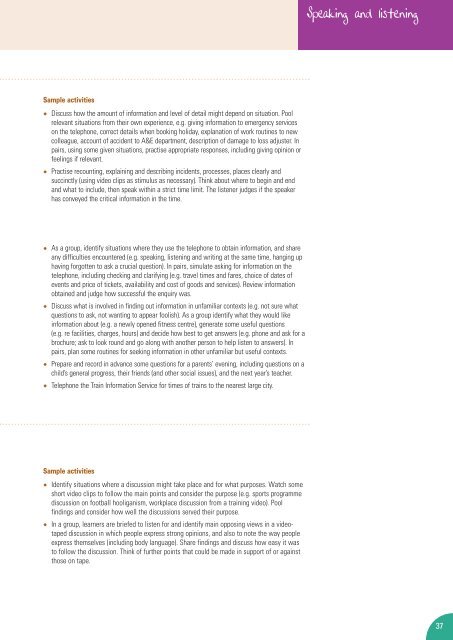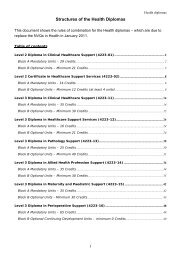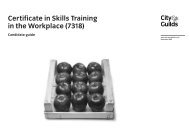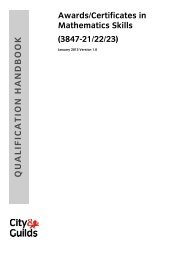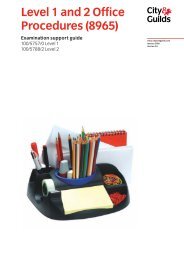Adult Literacy Core Curriculum - Nationally developed Skills for Life ...
Adult Literacy Core Curriculum - Nationally developed Skills for Life ...
Adult Literacy Core Curriculum - Nationally developed Skills for Life ...
Create successful ePaper yourself
Turn your PDF publications into a flip-book with our unique Google optimized e-Paper software.
Sample activities<br />
• Discuss how the amount of in<strong>for</strong>mation and level of detail might depend on situation. Pool<br />
relevant situations from their own experience, e.g. giving in<strong>for</strong>mation to emergency services<br />
on the telephone, correct details when booking holiday, explanation of work routines to new<br />
colleague, account of accident to A&E department, description of damage to loss adjuster. In<br />
pairs, using some given situations, practise appropriate responses, including giving opinion or<br />
feelings if relevant.<br />
• Practise recounting, explaining and describing incidents, processes, places clearly and<br />
succinctly (using video clips as stimulus as necessary). Think about where to begin and end<br />
and what to include, then speak within a strict time limit. The listener judges if the speaker<br />
has conveyed the critical in<strong>for</strong>mation in the time.<br />
• As a group, identify situations where they use the telephone to obtain in<strong>for</strong>mation, and share<br />
any difficulties encountered (e.g. speaking, listening and writing at the same time, hanging up<br />
having <strong>for</strong>gotten to ask a crucial question). In pairs, simulate asking <strong>for</strong> in<strong>for</strong>mation on the<br />
telephone, including checking and clarifying (e.g. travel times and fares, choice of dates of<br />
events and price of tickets, availability and cost of goods and services). Review in<strong>for</strong>mation<br />
obtained and judge how successful the enquiry was.<br />
• Discuss what is involved in finding out in<strong>for</strong>mation in unfamiliar contexts (e.g. not sure what<br />
questions to ask, not wanting to appear foolish). As a group identify what they would like<br />
in<strong>for</strong>mation about (e.g. a newly opened fitness centre), generate some useful questions<br />
(e.g. re facilities, charges, hours) and decide how best to get answers (e.g. phone and ask <strong>for</strong> a<br />
brochure; ask to look round and go along with another person to help listen to answers). In<br />
pairs, plan some routines <strong>for</strong> seeking in<strong>for</strong>mation in other unfamiliar but useful contexts.<br />
• Prepare and record in advance some questions <strong>for</strong> a parents’ evening, including questions on a<br />
child’s general progress, their friends (and other social issues), and the next year’s teacher.<br />
• Telephone the Train In<strong>for</strong>mation Service <strong>for</strong> times of trains to the nearest large city.<br />
Sample activities<br />
• Identify situations where a discussion might take place and <strong>for</strong> what purposes. Watch some<br />
short video clips to follow the main points and consider the purpose (e.g. sports programme<br />
discussion on football hooliganism, workplace discussion from a training video). Pool<br />
findings and consider how well the discussions served their purpose.<br />
• In a group, learners are briefed to listen <strong>for</strong> and identify main opposing views in a videotaped<br />
discussion in which people express strong opinions, and also to note the way people<br />
express themselves (including body language). Share findings and discuss how easy it was<br />
to follow the discussion. Think of further points that could be made in support of or against<br />
those on tape.<br />
Speaking and listening<br />
37


